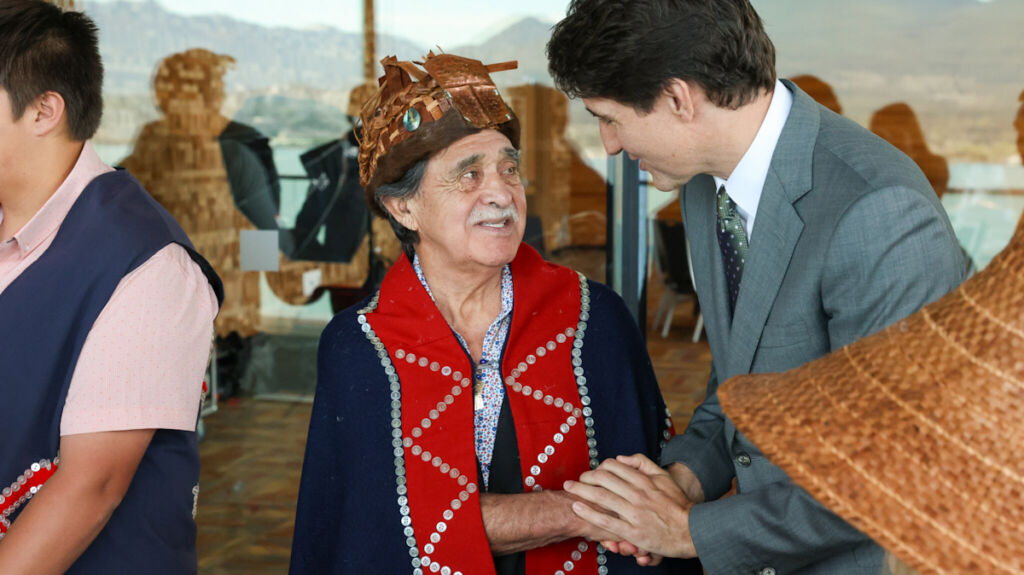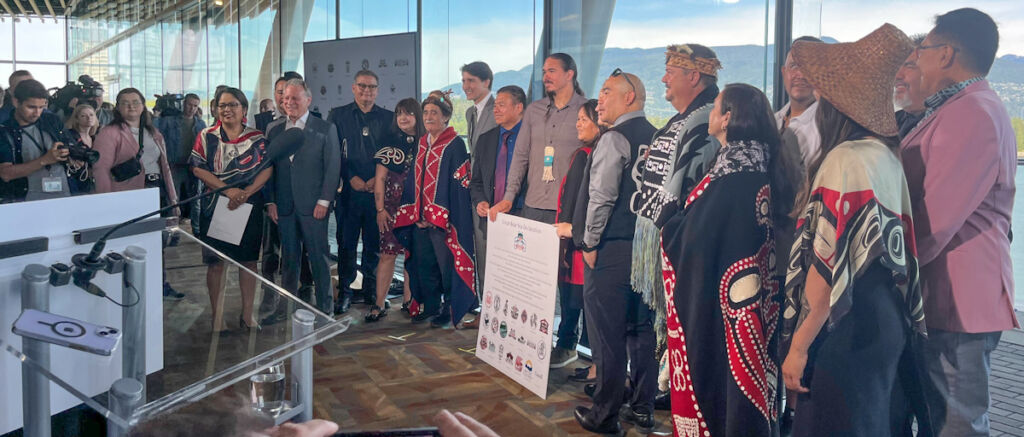Estimated Reading time

4 Mins
First Nations of the North Pacific Coast Celebrate Milestone for Coastal Conservation and Community Development
Coastal First Nations - Great Bear Initiative, Na̲nwak̲olas Council, and Coast Funds, along with the federal and provincial governments and philanthropic investors, are celebrating the closing of the Great Bear Sea Project Finance for Permanence (PFP) initiative.

JOINT NEWS RELEASE: Coastal First Nations – Great Bear Initiative, Na̲nwak̲olas Council, and Coast Funds
The Great Bear Sea PFP, led by 17 participating First Nations, launches a new era of collaborative governance in marine conservation and stewardship. A total of $335 million for the PFP —$200 million from the Government of Canada, $60 million from the Province of BC, and $75 million from philanthropic investors — ensures our communities will now have access to durable, long-term funding to care for our marine territories and support sustainable economic development on the coast.
First Nations across the North Pacific Coast/Great Bear Sea have cared for and governed these lands and waters since time immemorial. The Great Bear Sea (also known as the Northern Shelf Bioregion) extends from northern Vancouver Island to the Canada-Alaska border. The region is one of the richest and most productive cold-water marine ecoregions on Earth, home to marine life from herring and salmon to whales, dolphins, seabirds, and kelp forests. Stewarded and cared for by our Nations for tens of thousands of years, the Great Bear Sea is a source of sustenance, culture, and livelihoods for all who call the coast home.
“Almost 18 years ago, we announced the completion of a new conservation finance model for the Great Bear Rainforest, which is recognized as a world-leading success. We protected vast areas of ancient temperate rainforests, created nearly 1,300 jobs, launched over 130 new businesses, and raised household incomes across the region. And we were just getting started,” said Dallas Smith, President of Na̲nwak̲olas Council. “Our intent was always to protect land and sea. Today, we have followed through on this commitment to our ancestors, our Elders, our communities, and our future generations. The Great Bear Sea PFP is the model we need to protect marine ecosystems and restore biodiversity, all while supporting prosperous economies and healthy communities.”
Our intent was always to protect land and sea. Today, we have followed through on this commitment to our ancestors, our Elders, our communities, and our future generations.
PFPs are a proven tool for conservation finance that blend public and private investment to deliver long-term conservation and economic benefits. This investment will help protect important marine ecosystems while creating thousands of new jobs and supporting healthy communities over the coming decades.
The Great Bear Sea PFP will provide ongoing funding for the collaborative implementation of both the Marine Protected Area (MPA) Network Action Plan and the Marine Plan Partnership (MaPP). These two initiatives represent over a decade of work between our Nations, Canada, and British Columbia. Along with local governments and stakeholders from commercial fishing, tourism, energy, and other sectors, these initiatives have yielded multi-use marine plans along with a proposed network of marine protected areas that combines existing and potential new MPAs for an anticipated total of approximately three million hectares or 30 per cent of the Great Bear Sea. These co-developed plans will support healthy fisheries, protect and conserve ecosystems and important cultural sites, enable sustainable marine economies, improve food security, and increase coastal resilience.
“We believe that if we take care of the land, the land will take care of us, and if we take care of the ocean, the ocean will take care of us. These are our breadbaskets,” said K̓áwáziɫ (Marilyn Slett), President of Coastal First Nations – Great Bear Initiative. “The Marine Protected Area Network is designed to protect and conserve these important resources from a place of co-governance that honours our expertise and our jurisdiction over our territories. Together, we have created a model that will support the conservation goals the world needs – protecting locally and globally significant ecosystems and species – and ensuring our communities have the resources, training and equipment for durable and collaborative management.”

Coast Funds, the world’s first Indigenous-led conservation finance organization, will manage these funds on behalf of the participating First Nations. Over the next 20 years, Coast Funds expects the PFP will support more than 3,000 new jobs and 200 new businesses in marine stewardship, transportation and renewable energy, sustainable fisheries, eco-cultural tourism, and manufacturing and processing.
“With today’s announcement, First Nations are extending a successful model of collaborative stewardship, backed by durable conservation financing, from the rainforest to the sea,” says Eddy Adra, CEO, Coast Funds. “We look forward to continue working closely with First Nations, supporting them to invest in their community prosperity and marine stewardship programs which, in turn, will strengthen coastal communities and economies.”
By working together with our philanthropic investors, both in Canada and across the world, our Nations recognize that we have created the model we need to ensure the viability of our coast for generations to come.
With today’s announcement, First Nations are extending a successful model of collaborative stewardship, backed by durable conservation financing, from the rainforest to the sea.
“Today we celebrate the future of the Great Bear Sea and the people who depend on it — with a new co-governance model designed by First Nations and backed by large-scale financing that will create sustainability and prosperity across this region,” said Hadley Archer, Executive Director, Nature United. “Nature United is proud to have supported all of the governance partners towards this historic milestone, which demonstrates the power and potential of Indigenous-led, collaborative conservation. This is the model we need to replicate across Canada to tackle the dual biodiversity and climate crises while supporting resilient communities and economies.”
The 17 First Nations participating in the Great Bear Sea PFP are the Haida Nation, Gitga’at First Nation, Gitxaała Nation, Haisla Nation, Kitselas First Nation, Kitsumkalum First Nation, Metlakatla First Nation, Heiltsuk Nation, Kitasoo Xai’xais Nation, Nuxalk Nation, Wuikinuxv Nation, Da’naxda’xw Nation, K’ómoks First Nation, Kwiakah First Nation, Mamalilikulla First Nation, Tlowitsis Nation, and Wei Wai Kum First Nation.
For more photos and links, visit ourgreatbearsea.ca.

